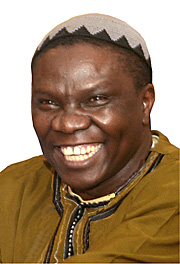By Diana Brement, JTNews Correspondent
SEATTLE—About 100 people came to Temple Beth Am on Monday night to hear Aaron Kintu Moses, the spiritual and educational leader of Ugandan’s Jewish community, speak and deliver a slide show on the Abayudaya Jews of Uganda.
Abayudaya means “tribe of Judah” in the Lugandan language, and its 800 members are primarily descendants of families who chose to become practicing Jews early in the 20th century. Members live in five villages, each with its own small synagogue, with the main Moses synagogue in the city of Mbale, a few hours from the capital of Kampala.
The founder of this Jewish movement, Semei Kakungulu, was selected by the colonial British to serve as a governmental liaison. In return, he expected to be named king of his tribe. Around 1912, when the British failed to appoint him to this position, he broke with them as well as with Christianity. Through his own studies of the Old and New Testament, Kakungulu became convinced of the correctness of Jewish practice, circumcised himself and his sons, and began preaching his beliefs.
Sporadic contacts with Jews from other countries furthered the practices of the Abayudaya, introducing them to rabbinic Judaism, the Jewish calendar, and other contemporary observances. The community keeps kosher, which is fairly simple according to Kintu Moses, since their diet is mostly fish and vegetables, and their synagogues use a mechitzah, or curtain, for the separation of men and women.
The group’s numbers have fluctuated over time for social and political reasons. Kintu Moses explained that during Idi Amin’s control, community members were forbidden to meet, severely restricting their ability to practice their religion. His own father was arrested for having a sukkah in his banana field, but was fortunately soon released. The Abayudaya’s numbers were reduced to around 300 people during that time, but over the past 30 years, their population has slowly grown.
The community has changed most significantly through their relationship with Kulanu (“all of us” in Hebrew), a grassroots non-profit organization that has helped the Abayudaya economically for about 15 years. Kulanu funds have helped to build schools and wells, acquire Torah scrolls, establish job training programs, and bring in microfinance ventures, among meeting other community needs. Their annual “mitzvah tours” bring visitors to volunteer and to see Uganda’s scenic beauty and wildlife in person. Kulanu is also involved in helping the community’s newest business venture: fair trade organic coffee. The coffee business is run by an interfaith cooperative, involving Islamic, Christian and Jewish farmers.
“When we had this group come,” Kintu Moses told his audience about Kulanu, “they asked, ‘how can we help?’ We told them: with friendship. Continue coming so we can learn from each other, and help our children [to] go to school.”
The primary, middle and high schools that the Abayudaya have built and currently operate also feed and house children from the five villages. Ugandan public schools teach only the majority religions, Islam and Christianity; Abayudaya schools teach Judaism as well. However, the schools have problems with staff turnover because they cannot match the salaries that the state pays.
The high school, which was completed in 1999, recently got electricity, which “allows students to study at night,” said Kintu Moses. So far, nine of their high school graduates have been admitted to university. However, poverty is rife in the area and there is no guarantee that students will find jobs when they return.
Kintu Moses is currently on a five-week tour of the United States. His visit to Seattle was spearheaded by Diane Baer of Temple Beth Am and made possible by the sponsorship of a consortium of local organizations including Temple De Hirsch Sinai, Temple B’nai Torah, Congregation Beth Shalom, Congregation Herzl-Ner Tamid, and the African American-Jewish Coalition for Justice.
Baer, a member of the Union of Reform Judaism’s Commission on Social Action, heard about Kintu Moses through that organization.
“The director sends us all kinds of stuff,” she says, most of which goes into the computer trash bin. “But when this came by in June, I knew we had to get him in Seattle.”
The visit here was also supported by Seattle residents Peter and Hinda Schnurman. The Schnurmans, who spend part of each year abroad as volunteers for the American Jewish World Service, have visited the Abayudaya. During the slide show that was part of the presentation, Kintu Moses showed a photograph of the high school’s new latrine, built with help from the Schnurmans.
CDs, coffee and knitted kippot are sold during Kintu Moses’ talks to benefit Kulanu. The CDs and coffee sold out quickly, and only a few kippot remained at the end of the evening. The Abayudaya have garnered world recognition for their music, in which they use traditional African as well as Jewish melodies.
Contact with Israel has been limited to personal visits by Israeli travelers and an occasional consular official, says Kintu Moses. And while a bet din (religious court) of American rabbis traveled to Uganda in 2002 and performed hundreds of conversions, according to Rabbi Scott Glass in his post on the Kulanu Web site (www.kulanu.org/old/beitdin1.html), there’s no certainty the Abayudaya would be accepted if they wanted to make aliyah to Israel. That, however, is only a remote and distant dream for this community of subsistence farmers in central Africa. Right now, they are struggling, much as we do in the United States, to provide their children with a good education, healthy food, and the core Jewish values that will allow them to continue their tradition for generations.
